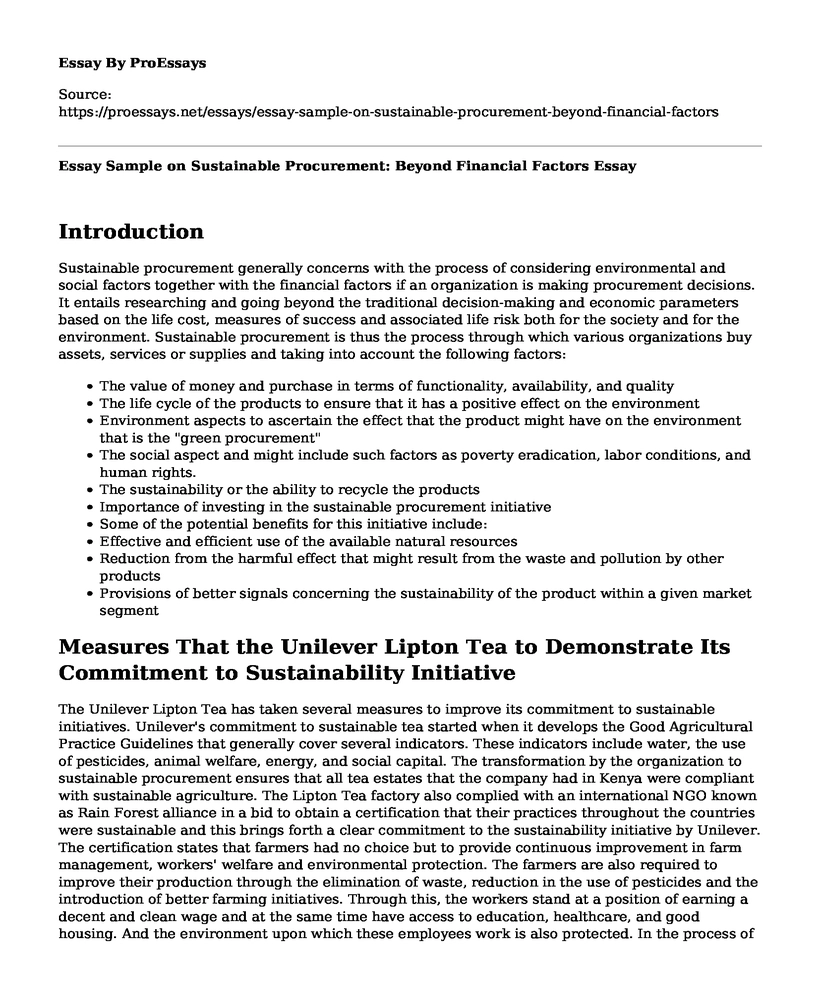Introduction
Sustainable procurement generally concerns with the process of considering environmental and social factors together with the financial factors if an organization is making procurement decisions. It entails researching and going beyond the traditional decision-making and economic parameters based on the life cost, measures of success and associated life risk both for the society and for the environment. Sustainable procurement is thus the process through which various organizations buy assets, services or supplies and taking into account the following factors:
- The value of money and purchase in terms of functionality, availability, and quality
- The life cycle of the products to ensure that it has a positive effect on the environment
- Environment aspects to ascertain the effect that the product might have on the environment that is the "green procurement"
- The social aspect and might include such factors as poverty eradication, labor conditions, and human rights.
- The sustainability or the ability to recycle the products
- Importance of investing in the sustainable procurement initiative
- Some of the potential benefits for this initiative include:
- Effective and efficient use of the available natural resources
- Reduction from the harmful effect that might result from the waste and pollution by other products
- Provisions of better signals concerning the sustainability of the product within a given market segment
Measures That the Unilever Lipton Tea to Demonstrate Its Commitment to Sustainability Initiative
The Unilever Lipton Tea has taken several measures to improve its commitment to sustainable initiatives. Unilever's commitment to sustainable tea started when it develops the Good Agricultural Practice Guidelines that generally cover several indicators. These indicators include water, the use of pesticides, animal welfare, energy, and social capital. The transformation by the organization to sustainable procurement ensures that all tea estates that the company had in Kenya were compliant with sustainable agriculture. The Lipton Tea factory also complied with an international NGO known as Rain Forest alliance in a bid to obtain a certification that their practices throughout the countries were sustainable and this brings forth a clear commitment to the sustainability initiative by Unilever. The certification states that farmers had no choice but to provide continuous improvement in farm management, workers' welfare and environmental protection. The farmers are also required to improve their production through the elimination of waste, reduction in the use of pesticides and the introduction of better farming initiatives. Through this, the workers stand at a position of earning a decent and clean wage and at the same time have access to education, healthcare, and good housing. And the environment upon which these employees work is also protected. In the process of their commitment to sustainability initiatives, the company took a promotional campaign to the UK, USA, and other European countries and it turns out to be a great success.
Benefits
Some of the Unilever companies might get from implementing sustainable procurement are, it will help the organization in maintenance cost because it will adapt several approaches to whole life costs. It will also assist them to achieve both internal and external standards for the operation of the company.
Commitment to sustainability will enable the Unilever company to comply with all the social and environmental legislation. Through the application of this, they will ensure their security for sustainable supply in the future.
Challenges
The main challenges for Unilever Turkey to attain sustainability include:
- The habit together with the difficulties for an organization to change the procurement behavior
- The perception by the management that the outcome and the process might be more costly or even time consuming
- Another barrier to consider is the inclusion of factors that might be broader than environmental conservation.
References
Grandia, J., & Voncken, D. (2019). Sustainable Public Procurement: The Impact of Ability, Motivation, and Opportunity on the Implementation of Different Types of Sustainable Public Procurement. Sustainability, 11(19), 5215. https://doi.org/10.3390/su11195215
Palmujoki, A., Parikka-Alhola, K., & Ekroos, A. (2010). Green Public Procurement: Analysis of the Use of Environmental Criteria in Contracts. Review Of European Community & International Environmental Law, 19(2), 250-262. https://doi.org/10.1111/j.1467-9388.2010.00681.x
Telles, P., & Olykke, G. (2017). Sustainable Procurement: A Compliance Perspective of EU Public Procurement Law. European Procurement & Public Private Partnership Law Review, 12(3), 239-252. https://doi.org/10.21552/epppl/2017/3/7
Cite this page
Essay Sample on Sustainable Procurement: Beyond Financial Factors. (2023, May 07). Retrieved from https://proessays.net/essays/essay-sample-on-sustainable-procurement-beyond-financial-factors
If you are the original author of this essay and no longer wish to have it published on the ProEssays website, please click below to request its removal:
- Proposal for Information System to Palace Hotel
- Case Study Example: Canada and Australia Salmon Importation
- Ordinary People Under Capitalism Essay
- Essay Sample on Business and Entrepreneurship
- Essay Example on ECUBIC: Edith Cowan University's Innovative Business Center
- Essay Example on Success of Restaurant: Uniting Production and Service Delivery
- F&B Industry: Adjusting to Rapid Change in the Hospitality Industry - Essay Sample







